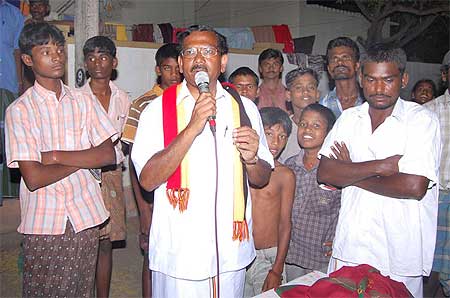
K Pandia Rajan is the founder of Ma Foi Management Consultants, the largest HR services provider and staffing company in India. The company, which started off with a capital of just Rs 60,000, has a turnover of Rs 783 crore and has helped generate career opportunities for more than 2,35,000 people in 36 countries.
It has been a very eventful journey for Pandia Rajan, who was brought up by his grandparents in a village in Sivakasi district of Tamil Nadu after he lost his father when he was just three months old. After doing engineering at the PSG College of Technology in Coimbatore, he studied Business Management at XLRI, Jamshedpur.
He and his wife Latha donated the profit they made from their company in the first year to Banyan, an NGO working for the mentally disturbed. In 1997, they started a Trust called Sornammal Educational Trust in the name of Pandia Rajan's grandmother to help the students of his village. The trust has also helped 30,000 women so far through various self-help groups. In 2007, the Ma Foi Foundation was formed as a platform for corporates and NGOs to work together. Today, the couple helps 3000 children from various corporation schools under the Disha Scholarship Scheme.
After working with many NGOs, he started the Confederation of Indian Organizations for Service and Advocacy where he brought all those NGOs under one umbrella. Now, Pandia Rajan has plunged into politics by joining film-star Vijayakanth's Desiya Murpokku Dravida Kazhagam. The party has nominated him from the newly-formed Virudhunagar constituency, his hometown. His major opponent is the firebrand politician Vaiko whose original constituency, Sivakasi, was lost to delimitation.
Pandia Rajan spoke to Shobha Warrier over phone from Virudhunagar where he has been campaigning day and night.
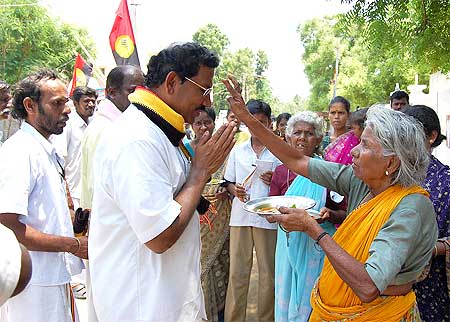
Your successful enterprise Ma Foi Consultants gives employment to thousands of people and you also do a lot of social work by educating hundreds of children. Why do you want to enter politics now?
I have always been interested in politics. As an engineering student, I was a union leader. Later, I was influenced by Jayaprakash Narayan during Emergency and I had this fascination for the Janata Party. After engineering, I went for further studies, and then I was establishing Ma Foi which I started with my wife. Now, I felt I had to join politics and I joined Vijayakanth's DMDK.
What was the reason why you chose the DMDK?
I joined the party two years back, after the last assembly elections (held in 2006). In Tamil Nadu politics, Vijayakanth has positioned himself as an alternative. If you look at the youth and women of Tamil Nadu, they are looking for a change and they see that change in him. That is why he could win so many votes in his first attempt itself, that too within three months of starting the party. Those who are fed up of the (dominant) two political parties in Tamil Nadu are looking up to him. I liked his personality and he certainly carried a measure of credibility.
How did Vijayakanth, a man from the film industry, respond to a professional like you when you showed interest in joining his party?
The moment I approached him, he was very welcoming. He then wanted me to be a part of the so-called think-tank of the party, to head it. He wanted the party to position itself uniquely in all the policies.
Did you tell him that you wanted to stand for the Lok Sabha elections?
Yes, I told him I wanted to. I didn't want to be an ivory tower politician; not the Rajya Sabha variety. The party gave me an opportunity to fight the rough and tough of elections.
I decided to stand from Virudhunagar constituency because my native place Vilampatti is in this constituency and I want to change the face of all these backward villages. He was happy with my decision.
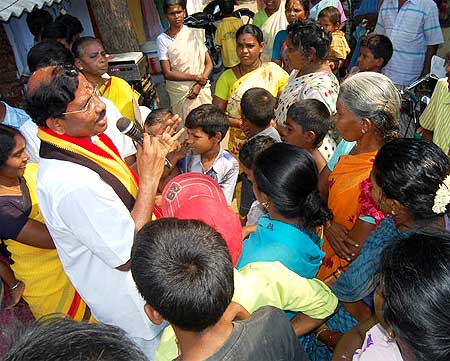
Even without being in politics, through the Ma Foi Foundation, you have helped many children educate themselves.
As an entrepreneur I can adopt hundreds of school children, but as a politician I will be able to do much more. What I am planning is scaling up what I am doing right now. With all the muscle of Ma Foi, we could only help around 3000 children and about 30,000 women. You can imagine how much we will be able to do if we can get the help of the political machinery. Politics is a mechanism where we can integrate education, industry and agriculture.
Most politicians promise a lot but once they win, they change. Would you also be like one of them?
I hope not. I am not entering politics as a greenhorn; I am fairly seasoned. I am also a part of the party that sticks by what it commits.
I read that you are using technology -- the internet -- to get in touch with people. How much is a place like Virudhunagar connected?
Ten per cent of the population has net connection here. There are 100,000 net users in this constituency. That is a big advantage. I wonder why other parties are not making use of this medium. This constituency is as good as any other constituency in that respect.
In what way are you using technology?
I am using technology for mass contact within the short period of two months. It is a great tool -- especially blogs, web site, videos on youtube.com, etc. First I created a web site for myself which I use mainly to contact people and let them contact me if they want to support me. It is also an internal communication tool for our own party functionaries. Through the web site and blog, I develop a close relationship with the people of my constituency.
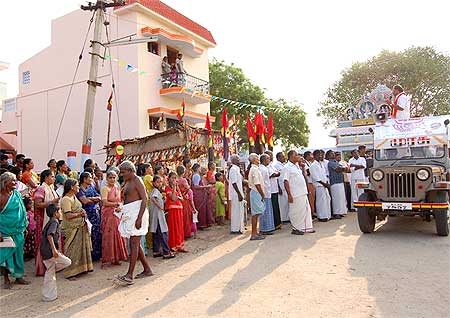
Why didn't you opt for an urban constituency where you can connect with people more efficiently?
I always wanted to contest from my native place. The identity is so strong for me. Yes, it would have been easier from an urban constituency but I feel more one with this place. I know every inch of this place.
Do they know you as the founder of Ma Foi?
No, they don't know what Ma Foi is. I do not look at that as a disadvantage. It is a very big challenge and I am trying to overcome that.
You have published a manifesto for your constituency which is a first of its kind. Why did you decide to have a separate manifesto?
I want to tell people what we can do for the constituency. I want to commit myself to the people. The manifesto with 98 schemes was prepared in consultation with NGOs, women's groups, the working class and the business community of the constituency. I have promised jobs for a minimum of one person in every family and merit scholarships for the education of the children of single parents. I plan to set up special agriculture zones, and entrepreneurial counselling centres in each assembly constituency. I plan to have a separate department to encourage organic farming.
In my manifesto, I have promised new link roads to all villages, improvement of all existing roads, water connection to all houses, internet kiosks in villages and uninterrupted power supply through non-conventional energy sources.
How do you look at a strong opponent like Vaiko who is so well known in the area? How tough is it to match up to him?
I agree his visibility is high, but I feel their party structure is not very strong though he has represented the constituency for the last 10 years. And, he has done nothing to write home about. I believe our party infrastructure is far better.
It is going to be a battle between the two of us. The others don't seem to be in the fray. I think people will look at a person who gets the grip of the local issues.
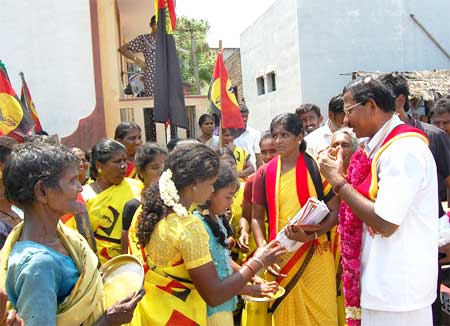
How do the people look at you, a person from Chennai?
I am basically from here. I have now shifted to Virudhunagar and have opened an office here. Initially people looked at me with a bit of amazement. Now I am more like the son of the soil!
55 per cent of the constituency is rural and people are looking for a change.
How hopeful are you about your chance?
I am quite confident. It looks like it will be a tough fight with Vaiko. The Congress has been written off already. There is a high degree of disillusionment in the entire constituency as people feel Vaiko hasn't done much in the last 10 years.
As an entrepreneur who runs a business house, where do you think you can have an edge over Vaiko?
I think in terms of the professional way I can run the constituency. You need to bring a professional approach to the agricultural, educational and health fronts. I can position the constituency much higher to bring in industries.